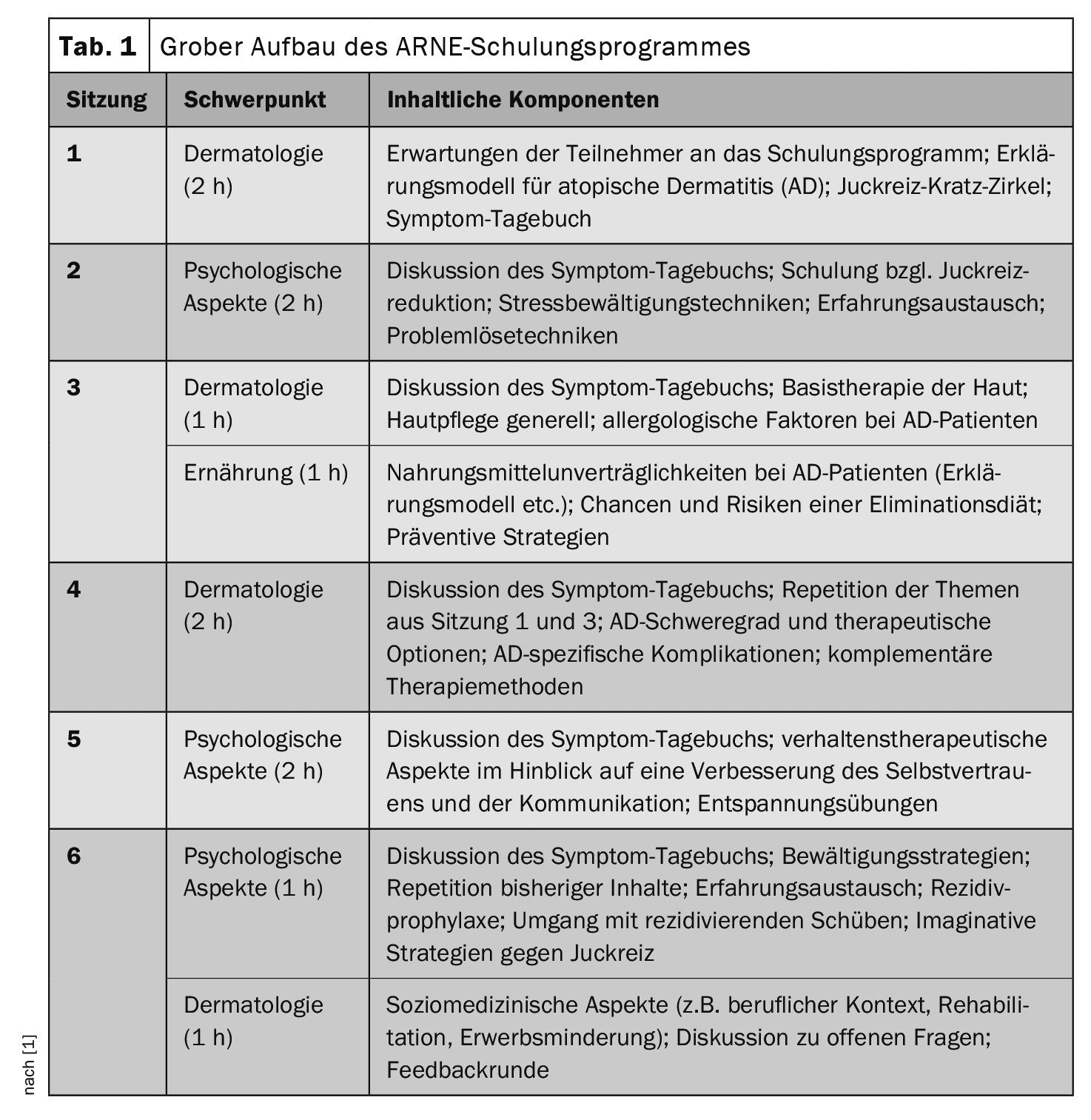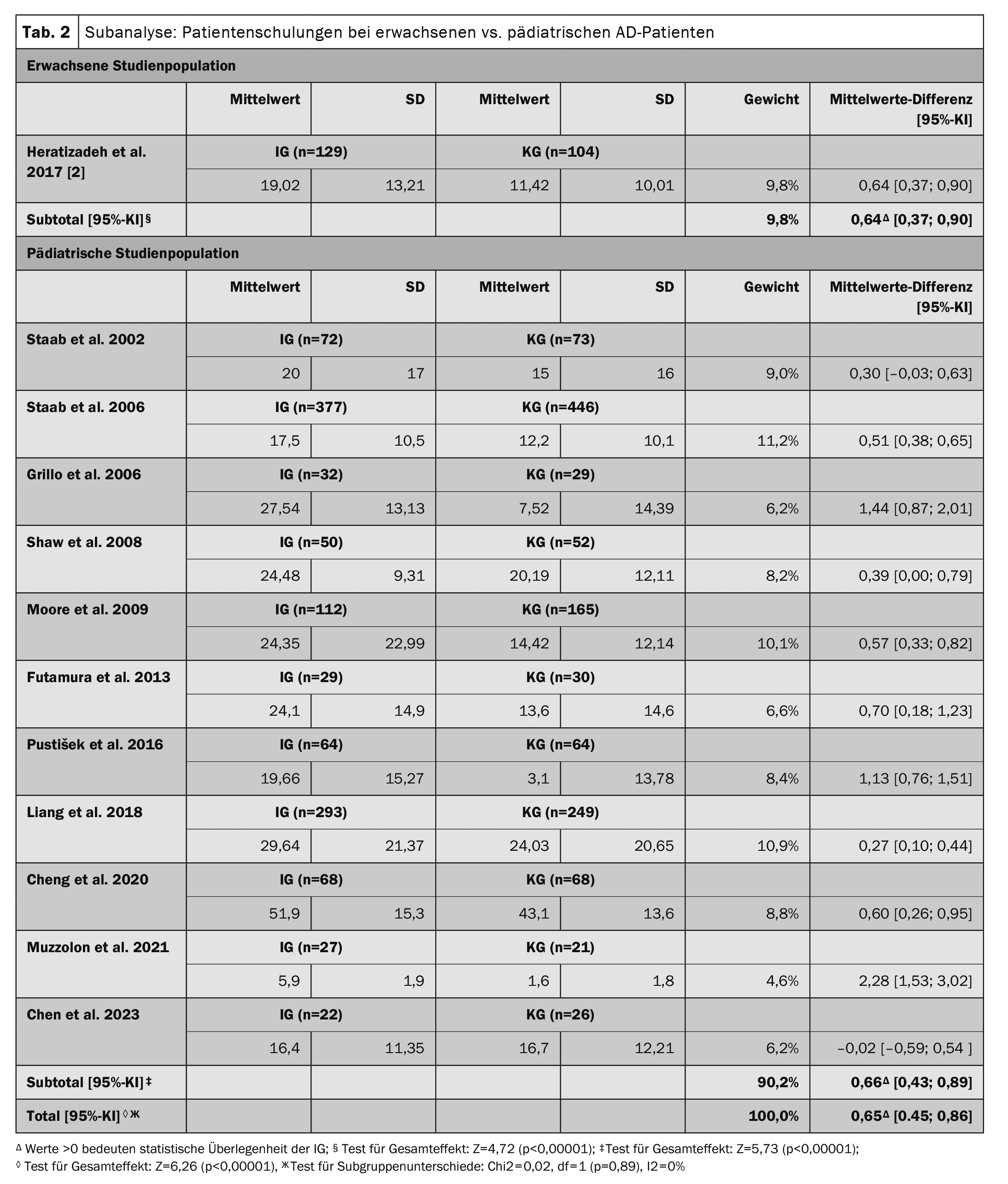As atopic dermatitis (AD) is a chronic, relapsing skin disease, a long-term treatment strategy is required. While training programs for parents of affected children have long been established, it has now been shown that structured, everyday patient education is also very useful for adult AD patients. This is one of the findings of a secondary analysis published in 2024.
Targeted patient education for adult AD patients can achieve similar effects to training programs offered for paediatric patients or their caregivers, the study authors concluded [1,2]. “It has been seen that it leads to a better understanding of the disease and better management of the disease,” said Prof. Marie-Charlotte Brüggen, MD, PhD, Head Physician, Department of Dermatology, University Hospital Zurich, summarizing the key messages [3]. An early onset of AD, a more severe form of manifestation in childhood, atopic comorbidities and a positive family history of atopic diseases were identified as risk factors for AD persisting into adulthood [4].
Reduction in AD severity and increase in quality of life
To date, there have only been a few randomized controlled trials on patient education in adult AD patients, which was also reflected in the present secondary analysis [1]. The average age of the included study participants was 7.15 years, with an age range of 2.40-34.53 years, i.e. including adult patients. Although the prevalence of AD is highest in childhood and adolescence, adults usually suffer from more complex forms of AD. In the randomized controlled prospective study by Heratizadeh et al. published in 2017, adult patients with moderate to severe AD in treatment centers in Germany were able to participate in a training program put together by a working group of multiprofessional experts** [2].
** Working group on neurodermatitis education for adults (ARNE)
After the initial examination, the patients randomized to the intervention group were trained in small groups of 5-8 participants for a total of 12 hours (1 double hour per session). Table 1 gives a rough overview of the structure and content of the training. The sessions were led by an interdisciplinary team of specialists (dermatologists, psychologists or educators and nutritionists) who had previously received study-specific instructions to ensure standardized implementation of the training program. Patients were randomly assigned to the intervention group or the control group. One year after baseline, patients in the intervention group (n=168) showed significantly better results$ in the following parameters compared to the control group (n=147):
- SCORAD (SCORing of Atopic Dermatitis) index (p<0.001),
- Coping behavior in relation to itching (p<0.001),
- Quality of life, assessed using the Skindex 29 questionnaire (p<0.001).
$ Data analysis is carried out according to the “intention-to-treat” principle
Table 2 shows that structured patient education improved SCORAD outcomes to a comparable extent in adults compared to pediatric populations. Overall, the standardized mean difference of 0.65 between all pooled SCORAD studies (Total [95%-KI]) suggests that patient education provides a moderate statistical improvement in terms of changes in this specific outcome metric. Specifically, the mean overall improvement was Z=6.26 (p<0.00001), which at first glance is below the value considered minimally important change (MIC) for absolute improvements in SCORAD [18]. However, it is important to note that some MIC criteria may vary depending on the severity of the disease, according to the study authors [19].
Treatment according to a step-by-step plan is crucial
Guideline-based treatment of AD requires a variety of measures tailored to the individual patient and is based on a step-by-step regimen [5]. The continuous use of emollients is recommended for all AD patients, even if there are no visible skin lesions [5]. One of the characteristic features of AD is impaired epidermal skin barrier function, which manifests clinically as dry skin and favors the penetration of allergens and other potentially harmful substances into the epidermis [5,6]. One aim of basic therapy is to restore the skin barrier. In addition to moisturizers that promote hydration of the stratum corneum (e.g. urea or glycerin), emollients also contain molecules that reduce water loss. Another important pillar of treatment is the use of anti-inflammatory and antipruritic agents in acute phases of AD (“flares”). These include topical corticosteroids (TCS), topical calcineurin inhibitors (TCI) and system therapeutics (e.g. ciclosporin, biologics, JAK inhibitors) or phototherapy.
Another important measure is the consideration of individually relevant exacerbation factors, such as concomitant sensitization to inhaled or food allergens or climatic factors (e.g. humidity and dryness). However, atopic comorbidities or critical impairments to quality of life should also be included in disease management [5].
Congress: Zurich Dermatology Training Days (ZDFT)
Literature:
- Andrade LF, et al: Effectiveness of atopic dermatitis patient education programs – a systematic review and meta-analysis. Arch Dermatol Res 2024 Apr 25; 316(5): 135.
- Heratizadeh A, et al: Adult atopic dermatitis education (ARNE) Study Group. Effects of structured patient education in adults with atopic dermatitis: Multicenter randomized controlled trial. JACI 2017; 140(3): 845-853.e3.
- “What’s New – Atopic Dermatitis”, Prof. Dr. med. Marie-Charlotte Brüggen, PhD, Zurich Dermatology Training Days (ZDFT), 22-23.06.2024.
- Weidinger S, Novak N: Atopic dermatitis. Lancet 2016; 387: 1109-1122.
- “Atopic dermatitis”, S3 guideline, 2023, AWMF register no. 013-027, https://register.awmf.org,(last accessed 01.10.2024).
- Langan SM, Irvine AD, Weidinger S: Atopic dermatitis. Lancet 2020; 396 (10247): 345-360.
- Staab D, et al: Evaluation of a parental training program for the management of childhood atopic dermatitis. Pediatr Allergy Immunol 2002; 13(2): 84-90.
- Staab D, et al: Age related, structured educational programmes for the management of atopic dermatitis in children and adolescents: multicentre, randomized controlled trial. BMJ 2006; 332(7547): 933-938.
- Grillo M, et al: Pediatric atopic eczema: the impact of an educational intervention. Pediatr Dermatol 2006; 23(5): 428-436.
- Shaw M, Morrell DS, Goldsmith LA: A study of targeted enhanced patient care for pediatric atopic dermatitis (STEP PAD) Pediatr Dermatol 2008; 25(1): 19-24.
- Moore EJ, et al: Eczema workshops reduce severity of childhood atopic eczema. Australas J Dermatol 2009; 50(2): 100-106.
- Futamura M, et al: Effects of a short-term parental education program on childhood atopic dermatitis: a randomized controlled trial. Pediatr Dermatol 2013; 30(4): 438-443.
- Pustišek N, et al: The significance of structured parental educational intervention on childhood atopic dermatitis: a randomized controlled trial. JEADV 2016; 30(5): 806-812.
- Liang Y, et al. : Therapeutic patient education in children with moderate to severe atopic dermatitis: a multicenter randomized controlled trial in China. Pediatr Dermatol 2018; 35(1): 70-75.
- Cheng NS, et al: A Nurse-led Parental Eczema Education Programme on Chinese Parents of Children with Eczema: a Randomized Controlled Trial. JACI 2020; 145(2): AB347.
- Muzzolon M, et al: Educational intervention and atopic dermatitis: impact on quality of life and treatment. Asia Pac Allergy 2021;11(2): e21.
- Chen HW, et al: Efficacy of a lay community health worker (promotoras de salud) program to improve adherence to emollients in Spanish-speaking Latin American pediatric patients in the United States with atopic dermatitis: a randomized, controlled, evaluator-blinded study. Pediatr Dermatol 2023; 40(1): 69-77.
- Wan J, et al: Racial/Ethnic variation in Use of Ambulatory and Emergency Care for atopic dermatitis among US children. J Invest Dermatol 2019; 139(9): 1906-1913e1.
- Andrade LF, et al: Impact of a Digital Atopic Dermatitis Educational Intervention on Hispanic patients and family members. J Clin Med 2023; 12(6): 2130.
DERMATOLOGIE PRAXIS 2024; 34(5): 34–36 (published on 28.10.24, ahead of print)













